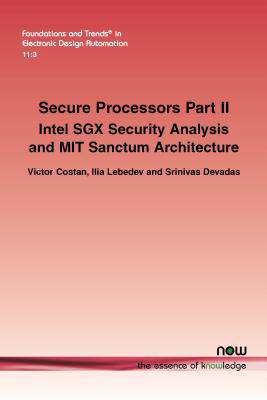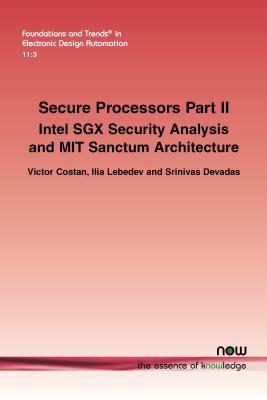
- Afhalen na 1 uur in een winkel met voorraad
- Gratis thuislevering in België vanaf € 30
- Ruim aanbod met 7 miljoen producten
- Afhalen na 1 uur in een winkel met voorraad
- Gratis thuislevering in België vanaf € 30
- Ruim aanbod met 7 miljoen producten
Zoeken
Secure Processors Part II
Intel Sgx Security Analysis and Mit Sanctum Architecture
Victor Costan, Ilia Lebedev, Srinivas Devadas
€ 92,45
+ 184 punten
Omschrijving
This manuscript is the second in a two part survey and analysis of the state of the art in secure processor systems, with a specific focus on remote software attestation and software isolation. The first part established the taxonomy and prerequisite concepts relevant to an examination of the state of the art in trusted remote computation: attested software isolation containers (enclaves). This second part extends Part I's description of Intel's Software Guard Extensions (SGX), an available and documented enclave-capable system, with a rigorous security analysis of SGX as a system for trusted remote computation. This part documents the authors' concerns over the shortcomings of SGX as a secure system and introduces the MIT Sanctum processor developed by the authors: a system designed to offer stronger security guarantees, lend itself better to analysis and formal verification, and offer a more straightforward and complete threat model than the Intel system, all with an equivalent programming model. This two part work advocates a principled, transparent, and wellscrutinized approach to system design, and argues that practical guarantees of privacy and integrity for remote computation are achievable at a reasonable design cost and performance overhead.
Specificaties
Betrokkenen
- Auteur(s):
- Uitgeverij:
Inhoud
- Aantal bladzijden:
- 128
- Taal:
- Engels
- Reeks:
- Reeksnummer:
- nr. 35
Eigenschappen
- Productcode (EAN):
- 9781680833027
- Verschijningsdatum:
- 13/07/2017
- Uitvoering:
- Paperback
- Formaat:
- Trade paperback (VS)
- Afmetingen:
- 156 mm x 234 mm
- Gewicht:
- 190 g

Alleen bij Standaard Boekhandel
+ 184 punten op je klantenkaart van Standaard Boekhandel
Beoordelingen
We publiceren alleen reviews die voldoen aan de voorwaarden voor reviews. Bekijk onze voorwaarden voor reviews.











